
Justice Evaluation Journal
Scope & Guideline
Advancing the discourse on justice systems.
Introduction
Aims and Scopes
- Evaluation of Justice Programs:
The journal emphasizes rigorous evaluations of various justice programs, including drug courts, mental health courts, and community supervision initiatives, assessing their effectiveness and impact on recidivism and public safety. - Application of Mixed Methods:
Utilizing both qualitative and quantitative methodologies, the journal presents mixed-methods research that enriches the understanding of complex justice issues, facilitating a more nuanced analysis of outcomes. - Focus on Innovative Justice Solutions:
The journal explores innovative approaches to justice, such as the use of technology in policing and community-based interventions, aiming to highlight effective strategies for crime reduction and rehabilitation. - Interdisciplinary Perspectives:
Emphasizing interdisciplinary research, the journal incorporates insights from criminology, sociology, psychology, and law, fostering a holistic understanding of justice-related problems and solutions. - Policy Implications and Recommendations:
The journal aims to bridge research and policy by providing actionable recommendations based on evaluation findings, thereby influencing justice policy and practice at various levels.
Trending and Emerging
- Impact of Technology on Justice:
There is an increasing focus on the role of technology, such as body-worn cameras and big data-driven policing, in shaping justice practices. This theme is crucial as it addresses modern challenges and innovations in law enforcement. - Recidivism Reduction Strategies:
A significant trend is the emphasis on evaluating programs aimed at reducing recidivism, including mental health courts and rehabilitation initiatives, highlighting a shift towards understanding effective interventions. - Community-based Justice Initiatives:
Emerging themes include evaluations of community-based programs that aim to empower youth and reduce crime through social interventions, reflecting a growing recognition of community engagement in justice. - Mental Health and Justice System Interactions:
There is a rising interest in the intersection of mental health and the justice system, particularly how mental health courts and related programs can mitigate recidivism and improve outcomes for individuals with mental health issues. - Restorative Justice Practices:
The journal is increasingly publishing research on restorative justice practices, indicating a growing interest in alternative approaches to traditional punitive measures within the justice system.
Declining or Waning
- Traditional Sentencing Evaluations:
There has been a noticeable decline in evaluations focused solely on traditional sentencing practices, such as mandatory minimum sentencing laws, as interest shifts towards more rehabilitative and restorative approaches. - Static Crime Analysis:
Research concentrated on static crime analysis, such as purely statistical approaches without considering dynamic social factors, appears to be waning, as the journal increasingly favors studies that integrate broader social contexts. - Overreliance on Single-method Studies:
There is a decreasing trend in studies that rely solely on quantitative methods. The journal's recent publications suggest a preference for mixed-methods research that provides richer, more comprehensive insights into justice issues. - Focus on Specific Offender Populations:
Research centered on specific offender populations, such as solely juvenile or solely white-collar offenders, is becoming less frequent as the journal expands its scope to encompass broader systemic issues affecting diverse populations. - Historical Case Studies:
The journal has shifted away from extensive historical case studies in favor of contemporary evaluations, reflecting a growing interest in current and emerging justice-related challenges.
Similar Journals
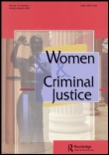
Women & Criminal Justice
Challenging Norms, Redefining JusticeWomen & Criminal Justice, published by Routledge Journals, Taylor & Francis Ltd, stands as a prominent platform for scholarly discourse in the intertwined realms of gender studies and legal research. Since its inception in 1989, this journal has been pivotal in addressing the unique challenges and perspectives of women within the criminal justice system, making substantial contributions to the field. With a commendable impact factor reflected in its Q1 ranking in Law and Q2 ranking in Gender Studies, it offers both researchers and practitioners rigorous and insightful analyses. The journal covers a wide spectrum of topics, aligning contemporary issues with legal frameworks, while advocating for a nuanced understanding of gender-related injustices. Though it operates under a traditional access model, its invaluable insights foster essential discussions among academics, policymakers, and social advocates. By engaging with themes of societal crime, victimization, and justice reform, Women & Criminal Justice continues to underscore the importance of integrating gender awareness into legal scholarship and practice, thereby enriching the broader academic community.
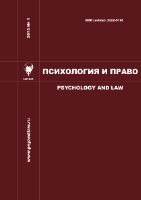
Psychology and Law
Fostering innovative research at the intersection of mind and justice.Psychology and Law, published by Moscow State Psychological & Pedagogical University, is an open-access journal dedicated to advancing knowledge at the intersection of psychology and legal studies. Since its establishment in 2011, the journal has provided a platform for high-quality research that addresses critical issues in applied, clinical, experimental, cognitive, and social psychology. Despite ranking in the Q4 quartile for various psychology categories in 2023, this journal remains committed to fostering insightful discussions and contributions to the field. Researchers and practitioners from diverse backgrounds are encouraged to explore its accessible content, which aims to enhance our understanding of psychological principles within legal contexts. The journal's ISSN is 2222-5196, and it primarily serves an international audience, promoting scholarly engagement and interdisciplinary collaboration. As the field evolves, Psychology and Law continues to be a vital resource for those seeking to bridge the gap between psychological research and legal practice.
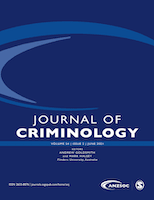
Journal of Criminology
Innovating research for a just society.Journal of Criminology, published by SAGE Publications Ltd, serves as a leading platform for scholarly discourse in the field of criminology, exploring the complexities of crime, justice, and social control. With an ISSN of 2633-8076 and an E-ISSN of 2633-8084, this open-access journal has quickly established itself, achieving a prestigious Q1 ranking in Law as per the 2023 Category Quartiles. Spanning a converged timeframe from 2021 to 2024, the journal primarily focuses on promoting innovative research and critical analyses that inform policy and practice within the legal frameworks and criminological theories. Its impactful contributions are evidenced by its impressive Scopus Rank of #104 out of 1025 in Social Sciences Law, placing it at the 89th percentile among its peers. Positioned in the heart of London at 1 Olivers Yard, 55 City Road, London EC1Y 1SP, England, the Journal of Criminology is dedicated to advancing knowledge and understanding in a rapidly evolving discipline, making it an invaluable resource for researchers, professionals, and students alike.

JOURNAL OF QUANTITATIVE CRIMINOLOGY
Bridging Disciplines for a Deeper Understanding of CrimeJOURNAL OF QUANTITATIVE CRIMINOLOGY, published by Springer/Plenum Publishers, serves as a premier outlet for cutting-edge research in the fields of law and forensic medicine. With an impressive impact factor and ranked in the top quartile (Q1) of both Law and Pathology and Forensic Medicine categories in 2023, this journal excels in providing empirical analyses and quantitative assessments that address critical issues in criminological research. Since its inception in 1985, the journal has maintained a reputation for excellence, evidenced by its high standing in Scopus rankings—21st out of 1025 in Social Sciences (Law) and 23rd out of 208 in Medicine (Pathology and Forensic Medicine). Although currently not an open access publication, it offers several subscription-based access options to reach a wide array of academics and professionals dedicated to the advancement of criminological and forensic inquiries. Researchers, professionals, and students will find the JOURNAL OF QUANTITATIVE CRIMINOLOGY an invaluable resource, as it fosters interdisciplinary collaboration and methodological rigor in understanding crime and criminal behavior.
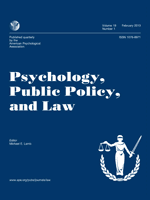
PSYCHOLOGY PUBLIC POLICY AND LAW
Bridging Minds and Justice.Psychology, Public Policy, and Law is an esteemed peer-reviewed journal published by the American Psychological Association (APA), focusing on the intersection of psychology and law. With a rich history dating back to 1995, the journal has solidified its importance in shaping legal practices and public policy through empirical research and theoretical analysis. It enjoys a prestigious ranking, notably within the Q1 category in both Law and Sociology & Political Science for 2023, reflecting its impactful contributions to these fields. Although access is not open, the journal is essential for researchers, practitioners, and students who seek to understand the psychological dimensions influencing legal decisions and policies. The journal's robust publication includes studies that provide insights on critical issues affecting society, making it a vital resource for advancing knowledge and informing policy at local, national, and international levels. With an ISSN of 1076-8971 and an e-ISSN of 1939-1528, it stands as a leading outlet for innovative research that bridges the gap between psychology, law, and public policy.
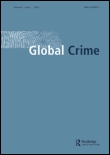
Global Crime
Unraveling Crime's Global Tapestry Through Scholarly InsightGlobal Crime is a leading scholarly journal published by Routledge Journals, Taylor & Francis Ltd, focusing on the multifaceted dimensions of crime and justice on a global scale. With an ISSN of 1744-0572 and E-ISSN of 1744-0580, this journal serves as a critical platform for researchers, practitioners, and policymakers interested in the intersection of legal studies, political science, and sociological perspectives. The journal boasts a prestigious Q1 ranking in Law and notable Q2 rankings in Political Science and International Relations, as well as Sociology, highlighting its influential role in shaping academic discourse. In 2023, it ranked #88 out of 1025 journals in Law, placing it in the 91st percentile, thus ensuring its status as an essential resource for those engaged in advanced research. While it does not currently offer open access options, Global Crime continuously seeks to illuminate the complexities of crime, fostering a better understanding through comprehensive studies, critical analyses, and innovative approaches. By converging insights from various disciplines, the journal aims to facilitate dialogue among academics and practitioners alike, ultimately advancing the field of criminal justice globally.
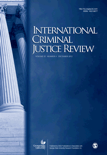
International Criminal Justice Review
Fostering innovative solutions for international crime.International Criminal Justice Review is a premier journal in the field of law, published by SAGE Publications Inc, renowned for its commitment to advancing the understanding of criminal justice issues on a global scale. With an ISSN of 1057-5677, this journal spans a rich history from its inception in 1991 to its ongoing contributions into 2024, supporting a diverse array of research that addresses both theoretical and practical concerns in international criminal law. The journal holds a prestigious Q1 ranking in the Law category for 2023, reflecting its influence and relevance, as evidenced by its impressive Scopus rank of #68 out of 1025 in the Social Sciences Law field, placing it in the 93rd percentile. Though not an open-access journal, it provides vital access options for institutions and individuals alike. International Criminal Justice Review serves as a critical resource for researchers, practitioners, and students dedicated to exploring the complexities of international criminal justice systems, offering a platform for innovative scholarship that informs policy and practice worldwide.
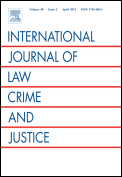
International Journal of Law Crime and Justice
Shaping the Future of Law and Justice Through ScholarshipThe International Journal of Law Crime and Justice, published by ELSEVIER SCI LTD, serves as a pivotal platform for the dissemination of cutting-edge research in the fields of law, crime, and justice. Established in 2008, the journal has established itself as a reputable source in its domain, holding a respectable Q2 ranking in Law, Political Science and International Relations, as well as Sociology and Political Science as of 2023. With an impact factor reflecting its influence, this journal ranks favorably within the top percentiles of Scopus in several social science categories, making it a critical resource for scholars and practitioners. The journal promotes open access, ensuring that vital research is accessible to a global audience. Scholars interested in the intricate intersection between legal studies, societal challenges, and crime will find the journal's objectives aligned with fostering knowledge and innovation in this dynamic field. Operating from its headquarters in London, England, the journal continues to invite substantial contributions that address contemporary issues and enhance our understanding of law and justice worldwide.

Asian Journal of Criminology
Exploring the Depths of Crime and Justice in AsiaAsian Journal of Criminology, published by SPRINGER, stands as a pivotal platform for scholarly communication within the field of criminology, boasting a notable impact factor and achieving a distinguished Q1 ranking in Law for 2023. Located in the Netherlands, this journal addresses the complexities of crime and justice in Asian contexts, fostering interdisciplinary discourse between researchers, practitioners, and policymakers. Since its inception in 2006 and continuing through to 2024, the journal has published a range of high-quality articles that explore theoretical frameworks, empirical research, and practical applications in criminology. Although the journal is not open access, it remains accessible through academic libraries and institutions, ensuring its wide reach among scholars and students. With a Scopus ranking of 143 out of 1025 in the field of Social Sciences Law, placing it in the 86th percentile, the Asian Journal of Criminology is essential for anyone looking to stay at the forefront of criminological research and its application in diverse societal contexts.
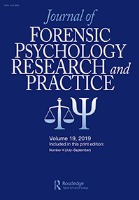
Journal of Forensic Psychology Research and Practice
Innovating Research for Real-World Forensic Applications.Journal of Forensic Psychology Research and Practice is a distinguished publication within the fields of Applied Psychology and Pathology and Forensic Medicine, published by Routledge Journals, Taylor & Francis Ltd. With a commitment to advancing knowledge from 2017 to 2024, this journal aims to bridge theory and practice by showcasing empirical research, including case studies and innovative methodologies, that address the complexities of forensic psychology in contemporary settings. While it holds a respectable Q3 ranking in both Applied Psychology and Pathology and Forensic Medicine, making it a vital resource for scholars and practitioners alike, its insights contribute significantly to understanding the psychological aspects of criminal behavior and legal processes. Researchers, professionals, and students are encouraged to engage with its content to further their understanding and application of forensic psychology principles in real-world scenarios.